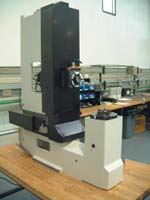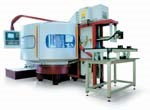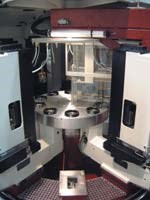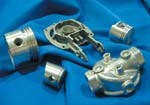New Twist On Rotary Transfer Machines
Rotary transfer machines are productive high volume producers of a wide variety of workpieces. While traditional rotary transfer machines are very capable of volume production of complex workpieces, they tend to be more dedicated with regard to job changeover, with the exception of families of parts.
Share




Rotary transfer machines are productive high volume producers of a wide variety of workpieces. While traditional rotary transfer machines are very capable of volume production of complex workpieces, they tend to be more dedicated with regard to job changeover, with the exception of families of parts.
In what might be described as a nod to the future of rotary transfer machine technology, Hydromat (St. Louis, Missouri) has introduced its new AT (Advanced Technology) machine. The new design departs from the company's traditional rotary transfer machine configuration in several significant ways.
The AT is designed to produce mid- to high-volume quantities of parts originating from irregular shaped casting and forging blanks. It's full CNC with servo driven ballscrew axis actuation.
Designed as a pallet machine, the AT is available with eight or ten stations and accommodates a work cube of 4.5 inches (115 mm). Machining modules are conventional three-axis X-Y-Z that can be configured for five-axis machining if needed. Tooling possibilities include horizontal or vertical toolspindle units and multi-tool turrets for multi-tasking. Each unit can be equipped with an automatic tool changing system holding redundant or common tools.
Each machining unit is modular. Constructed of a single piece casting, these units are built as a C-frame machining center. The workpiece pallet is mounted on the same structure as the machining spindle axes. This maintains relative positions of the workpiece and cutting tool within the machining unit itself.
The pallet system on the AT uses the Erowa modular power chuck for accurate location of the pallets. With this system workpieces are mounted on a pallet that is transferable from one receiver to another, around the periphery of the rotary table. This power chuck system uses a Hirth coupling ring to locate each pallet in its receiver. Clamping pressure is 2,033 pounds (9,000 N). The Hirth ring gives location accuracy and repeatability of 2 microns or less.
When the machine indexes from one machining unit to the next, the rotary table lifts and transports the palletized workpiece from one station to the next. All pallets unclamp and are moved in unison.
Because the pallet receivers are integral to the machining unit, the table is simply a transfer device and has no impact on position or accuracy of the workpiece relative to the machining spindle. When the index is complete, the rotary table lowers the pallets onto its receiver, and the Erowa system clamps it in place on the machining module.
The AT is designed as a multi-processing machine tool and as such it is capable of milling, drilling, tapping and turning. The machining module mounted receiver is servo driven and can rotate at 5,000 rpm if a turning operation is required for part processing. This CNC rotary axis can also be programmed for contour machining.
Workpiece candidates for the AT include piston manufacture for small displacement internal combustion engines. The Erowa system allows the piston to be clamped in the ID so overall turning can be done on the OD. The machining models can also cut the oil and compression ring grooves as well as the wrist pin holes. Pistons come off the machine complete. Other job candidates are brake components, appliance and instrument housings, valve and faucet bodies, and parts that require angular machining beyond the fixturing capabilities of conventional rotary transfer machines.
Read Next
Building Out a Foundation for Student Machinists
Autodesk and Haas have teamed up to produce an introductory course for students that covers the basics of CAD, CAM and CNC while providing them with a portfolio part.
Read More5 Rules of Thumb for Buying CNC Machine Tools
Use these tips to carefully plan your machine tool purchases and to avoid regretting your decision later.
Read MoreRegistration Now Open for the Precision Machining Technology Show (PMTS) 2025
The precision machining industry’s premier event returns to Cleveland, OH, April 1-3.
Read More
























.png;maxWidth=300;quality=90)










